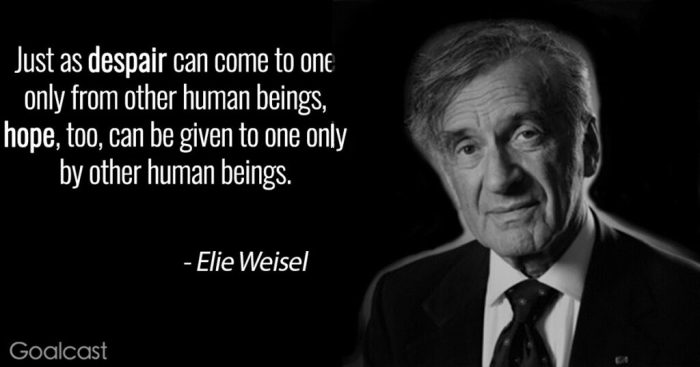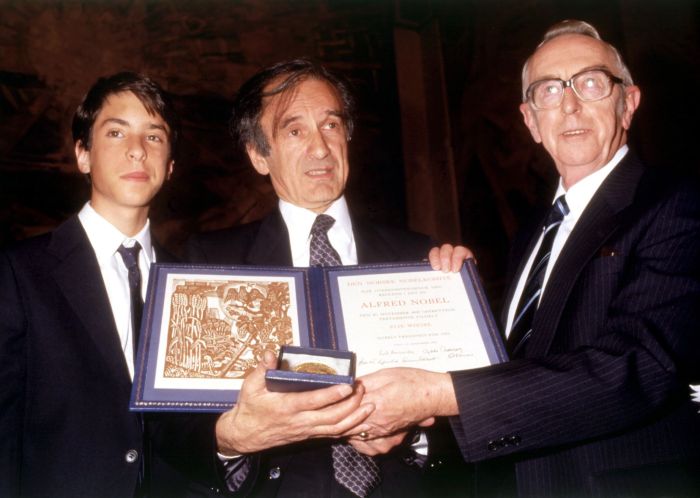Hope despair and memory elie wiesel – Hope, despair, and memory intertwine in Elie Wiesel’s writings, forming a tapestry that explores the human condition in the face of adversity. Wiesel’s experiences during the Holocaust shape his perspective, providing a unique lens through which he examines the complexities of hope and despair.
Wiesel’s work serves as a poignant reminder of the horrors of the Holocaust and the resilience of the human spirit. It challenges readers to confront the darkness of history while also finding solace in the enduring power of hope.
Hope and Despair in Wiesel’s Work: Hope Despair And Memory Elie Wiesel

Elie Wiesel’s writing is a powerful exploration of the human experience in the face of unimaginable suffering. Through his personal experiences as a Holocaust survivor, Wiesel paints a vivid picture of the complex interplay between hope and despair, highlighting their inextricable connection and the profound impact they have on individuals and communities.
Hope in the Face of Despair, Hope despair and memory elie wiesel
Despite the horrors he endured, Wiesel’s writing is infused with a persistent glimmer of hope. In the depths of despair, he finds moments of compassion, resilience, and even joy. For example, in his memoir Night, Wiesel describes the camaraderie and support among the prisoners in the concentration camps, providing a beacon of light amidst the darkness.
Despair in the Face of Hope
Equally powerful is Wiesel’s portrayal of despair. He shows how even in moments of hope, the shadow of despair can linger. In Night, the prisoners’ initial optimism is shattered by the horrors they witness, leaving them with a profound sense of hopelessness and loss.
The Role of Faith and Spirituality
Wiesel’s writing also explores the role of faith and spirituality in shaping these emotions. In the face of unimaginable suffering, many of his characters find solace and strength in their beliefs. However, Wiesel also questions the limits of faith, highlighting the ways in which it can be both a source of comfort and a source of torment.
Memory and the Holocaust
Elie Wiesel’s work is deeply concerned with the Holocaust and its aftermath. Memory plays a central role in his writing, as he explores the ways in which the Holocaust can be remembered, forgotten, and confronted.
Memory as a Tool for Understanding and Confronting the Holocaust
For Wiesel, memory is essential for understanding the Holocaust. By remembering the victims and the perpetrators, we can learn from the past and prevent future atrocities. Memory also allows us to confront the Holocaust and its legacy, and to come to terms with its horrors.
Memory as a Source of Pain and a Source of Strength
Memory can be both a source of pain and a source of strength. On the one hand, remembering the Holocaust can be painful and traumatic. It can bring back memories of loss, suffering, and death. On the other hand, memory can also be a source of strength.
It can help us to understand the Holocaust and its victims, and to find meaning in the face of tragedy.
The Ethical Implications of Remembering and Forgetting the Holocaust
There are important ethical implications to remembering and forgetting the Holocaust. On the one hand, it is important to remember the Holocaust so that we can learn from the past and prevent future atrocities. On the other hand, it is also important to forget the Holocaust in some ways, so that we can move on with our lives and build a better future.
The Holocaust is a complex and difficult subject, and there are no easy answers when it comes to remembering and forgetting. However, Wiesel’s work reminds us that memory is essential for understanding the Holocaust and its legacy, and that we must continue to confront its horrors and learn from the past.
The Importance of Witnessing

Bearing witness to the Holocaust is of paramount significance for several reasons. First, it ensures that the horrors of the past are not forgotten and that the victims are remembered. Second, it helps to prevent future atrocities by raising awareness of the dangers of hatred and intolerance.
Third, it provides a sense of closure and healing for survivors and their families.Literature and art play a crucial role in preserving the memory of the Holocaust. Through books, films, and other works of art, the stories of survivors can be shared with a wider audience, ensuring that the Holocaust is never forgotten.Wiesel’s
work has been particularly influential in inspiring others to speak out against injustice. His powerful writing has helped to raise awareness of the Holocaust and has encouraged people to stand up for what is right.
The Role of Literature and Art
Literature and art can play a powerful role in preserving the memory of the Holocaust. By creating works that depict the experiences of survivors, artists and writers can help to ensure that the Holocaust is never forgotten.One of the most famous examples of Holocaust literature is Elie Wiesel’s novel Night. This novel tells the story of Wiesel’s own experiences as a prisoner in Auschwitz.
The novel is a powerful and moving account of the horrors of the Holocaust, and it has helped to raise awareness of the genocide among a wide audience.Other works of Holocaust literature include Anne Frank’s diary, Primo Levi’s If This Is a Man, and Art Spiegelman’s Maus. These works all provide valuable insights into the experiences of Holocaust survivors, and they have helped to ensure that the Holocaust is never forgotten.
Hope Beyond Despair
In the face of the Holocaust’s unimaginable horrors, Elie Wiesel’s writings reveal instances where he finds hope amidst the darkness. These glimmers of hope emerge from unexpected sources and sustain individuals in the face of adversity, highlighting the indomitable spirit of humanity.
One source of hope for Wiesel is the enduring power of the human spirit. Even in the most dehumanizing conditions, individuals retain their capacity for compassion, resilience, and hope. In the concentration camp, Wiesel witnesses acts of kindness and solidarity among prisoners, demonstrating that the bonds of human connection cannot be extinguished by cruelty.
The Importance of Maintaining Hope
Maintaining hope in the face of adversity is crucial for survival. It provides individuals with the strength to endure suffering, the courage to resist oppression, and the belief that a better future is possible. Hope serves as a beacon of light in the darkest of times, inspiring individuals to persevere and strive for a more just and humane world.
The Legacy of Wiesel’s Work

Elie Wiesel’s writings have had a profound impact on Holocaust education and remembrance. His vivid and unflinching accounts of the horrors he witnessed and experienced have helped to raise awareness of the Holocaust and its victims, and have contributed to a greater understanding of the dangers of hatred and intolerance.
Influence on Other Writers and Artists
Wiesel’s work has also had a significant influence on other writers and artists. His writings have inspired countless works of literature, art, and film, and have helped to shape the way that the Holocaust is represented in popular culture. For example, his novel Nighthas been translated into more than 30 languages and has been adapted into several films and plays.
Ongoing Relevance of Wiesel’s Message
Wiesel’s message of hope and despair remains relevant in the contemporary world. His writings remind us of the horrors of the Holocaust and the importance of fighting against hatred and intolerance. They also offer a message of hope, reminding us that even in the darkest of times, there is always hope for a better future.
FAQ
What is the significance of memory in Elie Wiesel’s work?
Wiesel uses memory as a tool for understanding and confronting the Holocaust. He believes that remembering the past is essential for preventing future atrocities.
How does Wiesel portray the role of faith in the face of despair?
Wiesel’s faith in God is tested by the horrors of the Holocaust. However, he ultimately finds solace and strength in his belief, which helps him maintain hope amidst despair.
What is the importance of bearing witness to the Holocaust?
Bearing witness to the Holocaust is essential for preserving its memory and preventing future genocides. Wiesel’s work plays a crucial role in this process, ensuring that the voices of the victims are not forgotten.